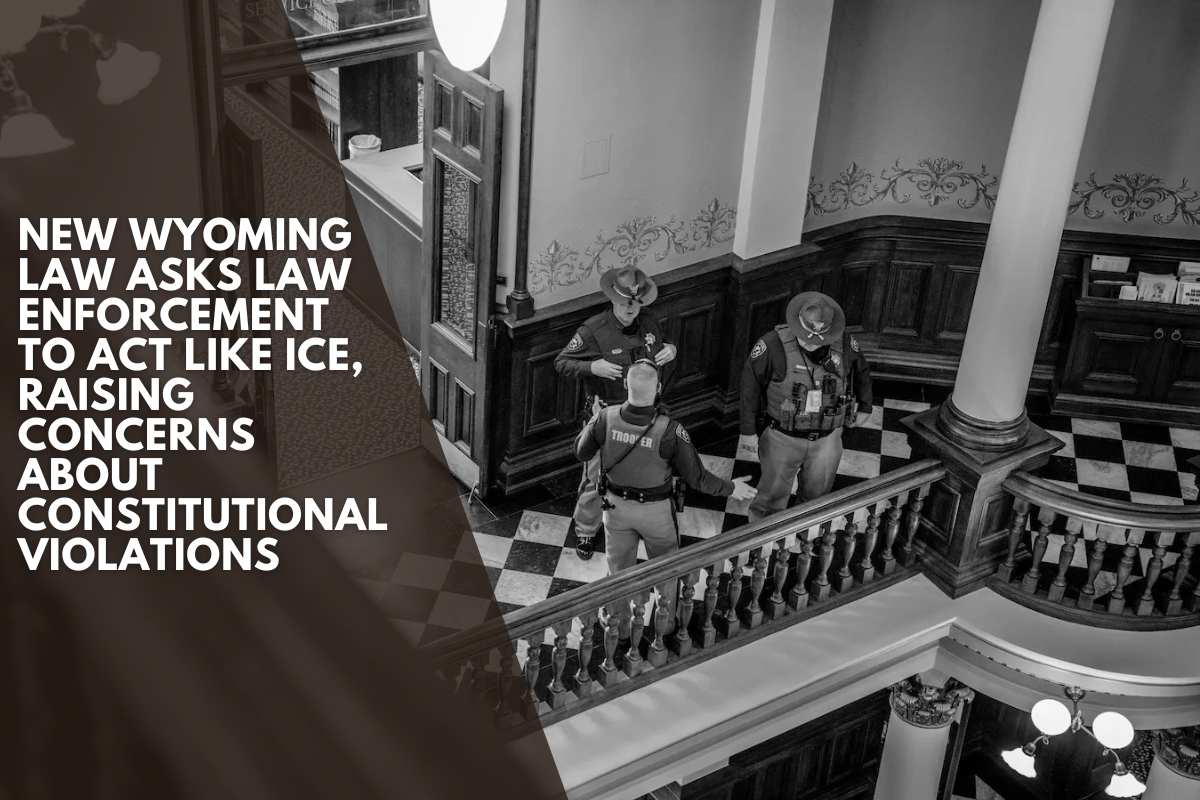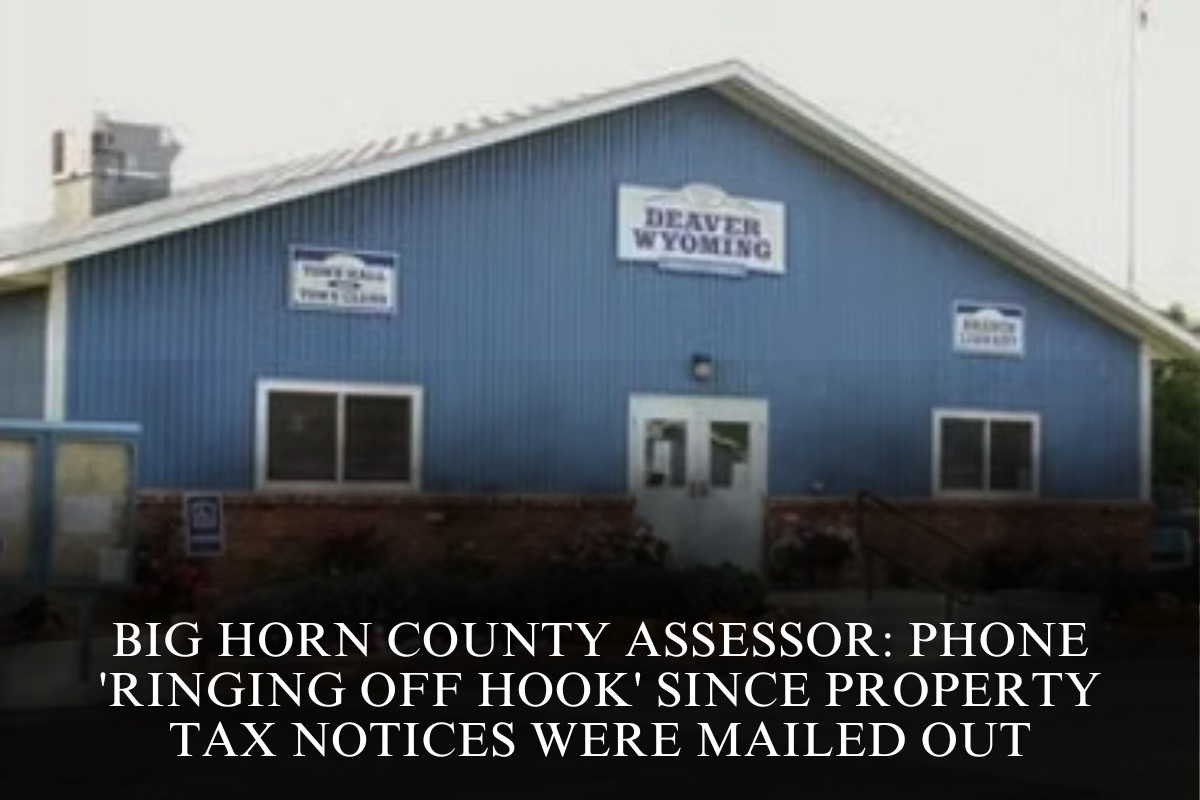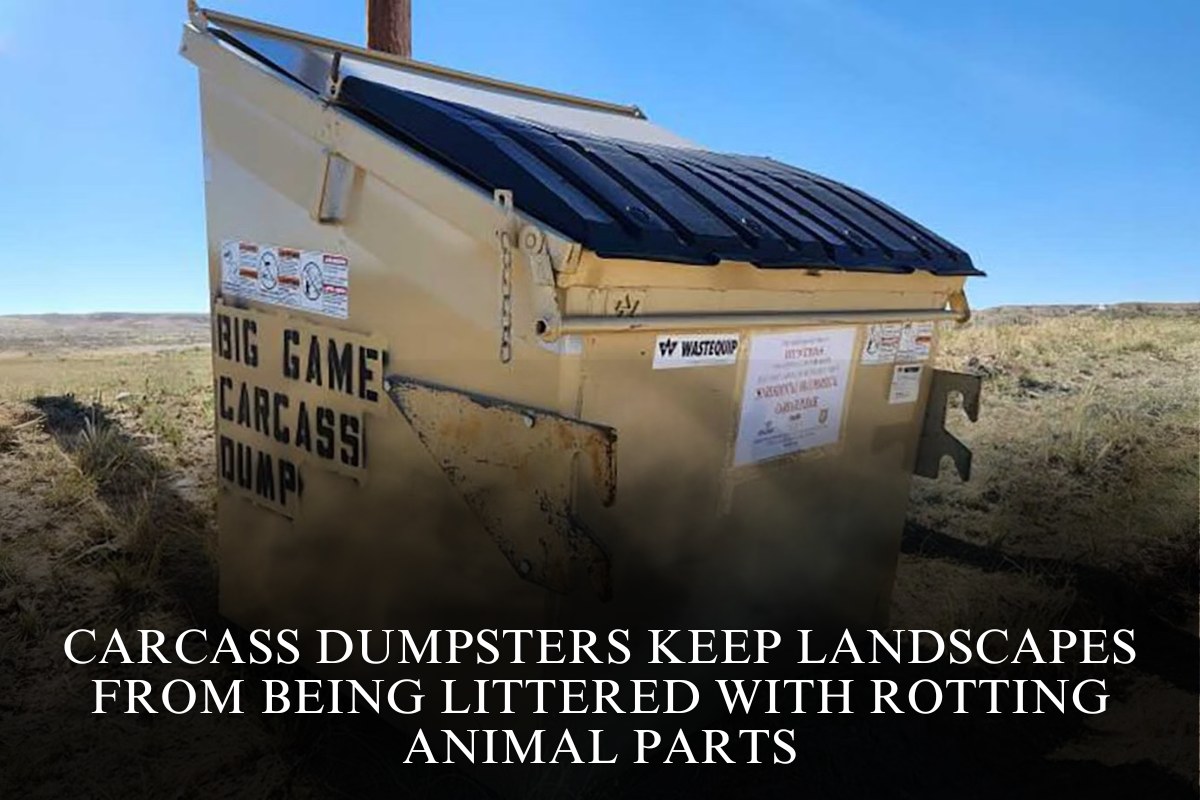The Laramie County Sheriff’s Office, one of the state’s larger police agencies, has advised deputies to limit enforcement of Wyoming’s new law that invalidates driver’s licenses issued to undocumented immigrants in some states.
County attorneys who reviewed the new law warned the department that deputies would struggle to enforce it without violating people’s constitutional rights, according to a departmental guidance document provided to WyoFile.
“The last thing anyone wants is expensive, time-consuming, and potentially embarrassing litigation over these new laws,” according to the instructions.
In essence, the concern in Laramie County is one that opponents of the law frequently expressed during legislative debate this winter.
Deputies and police officers who are not federal immigration enforcement officers are not well equipped to determine whether a person they stop on suspicion of a traffic violation or another local infraction is legally present in the country. The guidance warns that this could result in traffic stops that are unconstitutionally long.
County attorneys suggested that the department only cite or arrest undocumented immigrants with driver’s licenses from two states: Connecticut and Delaware. These two states issue licenses that clearly state that the individual is in the country illegally.
This finding is consistent with the limitations imposed by another state, Florida, when lawmakers sought to prohibit undocumented immigrants from driving in 2023. Florida ultimately restricted such licenses to Connecticut and Delaware.
As many as 19 states issue licenses to undocumented individuals indicating that the carrier is not a citizen. However, drivers with the same license could be legally present in the country under a variety of valid visas.
Other agencies, including the Wyoming Highway Patrol, told WyoFile that if officers pull over a driver with a non-citizen license, they will request proof of lawful presence in the country.
However, Laramie County Chief Deputy Aaron Veldheer told WyoFile that deputies are unfamiliar with such documents and may be unsure of their validity. Deputies can call the feds to confirm someone’s status or try to enlist a few deputies in the department who have been trained by ICE in immigration enforcement, Veldheer explained. However, if there is no quick answer or evidence of another crime, a driver cannot be detained indefinitely.
Meanwhile, immigration attorneys and advocates, as well as the Mexican Consulate in Denver, used social media to highlight the law’s implementation, reminding drivers that they have the right to remain silent if local law enforcement inquires about their immigration status.
Laramie County’s analysis seems to agree, reminding deputies that “a marked license holder is not required to answer any questions, with or without Miranda warnings.”
Attorneys say Laramie County’s fear of litigation is justified. Rosie Read, a Jackson attorney and director of the Wyoming Immigrant Advocacy Project, described the new law as the “most restrictive anti-immigrant law in the country.” She hoped and expected it to be challenged on constitutional grounds, she said.
It is unclear whether anyone has been arrested or cited for driving with one of the now-banned licenses, which were created by other state legislatures to ensure that drivers pass a test and have insurance even if they are illegally present in the country.
Wyoming Highway Patrol officers have yet to cite or arrest anyone for violating the new law, according to the agency’s chief, Col. Tim Cameron.
Aside from this new law, Laramie County Sheriff Brian Kozack has been one of the state’s most outspoken supporters of working with US Immigration and Customs Enforcement.
He has made his jail and some of his deputies available to the federal government through agreements with ICE, as the agency ramps up detentions and deportations across the country, including Wyoming.
Laramie County law enforcement was not alone in expressing concern about the new law, with questions about its implementation being raised throughout the state.
Sheriff Matt Carr of Teton County told the Jackson Hole News&Guide earlier this month that his agency was awaiting guidance from the Wyoming Department of Transportation. However, a WYDOT spokesperson told WyoFile that the agency is not preparing any guidance.
Carr told WyoFile on Tuesday that he had now directed his deputies to base their enforcement on WHP’s trooper guidance.
Cameron told WyoFile that WHP’s guidance reminds officers that drivers cannot be pulled over solely based on suspicion of their immigration status.
“The stops are not based on driver’s license status but based on the observations of a [traffic or criminal] violation by that trooper,” Cameron informed the press.
When WHP officers receive a driver’s license with markings indicating that the person is not a US citizen, they are instructed to request documentation demonstrating a lawful presence in the country, according to Cameron. The Laramie County deputies have been advised against doing so, according to department policy.
The procedure “would require the [deputy] to have some knowledge of immigration documents, their significance, and the validity of these documents,” according to the protocol.
Gov. Mark Gordon allowed the driver’s license bill, a top priority for the Wyoming Freedom Caucus, to become law without his signature, expressing reservations but declining to veto it. If he had attempted a veto, he might have been overridden.
“My hope is that Wyoming law enforcement resources are used to assist in illegal presence operations but not to take the lead in determining one’s status through credentials both issued and dictated by other states’ laws,” Gordon stated in a letter explaining his decision at the time.
Driving with one of these licenses is punishable by a fine or imprisonment, according to the law. Allen Thompson, executive director of the Wyoming Association of Sheriffs and Chiefs of Police, told WyoFile that it will be up to individual departments and their officers on the street to decide whether someone found driving with such a license is cited or arrested.
He stated that his organization’s members are divided on whether to conduct an arrest or write a ticket. However, Thompson noted that if someone does not have a licensed driver to take the wheel, officers are unlikely to let them drive away after a traffic stop.
According to previous WyoFile reporting, undocumented immigrants living in Wyoming hold driver’s licenses from other states that provide them to people without legal presence in the country.
Now, depending on the county, those Wyomingites risk being fined, at best, or jailed and turned over to U.S. Immigration and Customs Enforcement.
Drivers stopped in Teton County with undocumented immigrants’ licenses may be booked into jail, according to Carr. Following criticism from U.S. Rep. Harriet Hageman and state Republicans, Carr has announced that his jail will comply with ICE requests to hold people arrested on suspicion of local crimes for 48 hours.
Teton County, on the other hand, is not one of the five sheriff’s departments that have signed agreements to facilitate the transfer of illegal immigrants to federal detention and deportation facilities.
During President Donald Trump’s second term, that system expanded its reach in unprecedented ways, and it is expected to grow even further following a massive funding infusion from Republicans in Congress.
Under pressure to increase deportation rates, ICE is increasingly targeting undocumented immigrants with no criminal convictions for deportation.
WyoFile and the Colorado Sun conducted a recent analysis of ICE arrest data and discovered that the majority of people detained by the federal agency in Wyoming do not have criminal convictions, though they may have pending charges.
Read has recently witnessed people arrested on suspicion of minor local infractions being quickly picked up by ICE from jail, she said.
Her advice to undocumented immigrants across the state is to give law enforcement no opportunity to conduct a traffic stop, given the uncertainty of the outcome. “Drive minimally, and if you must drive, be very careful, repair cracks in your windshield, make sure your tail lights are working, do everything you can to make sure you’re not going to be pulled over,” she indicated to WyoFile this past week.
Notably, all five sheriff’s departments that have signed agreements with ICE are located near major highways. Sweetwater, Carbon, and Laramie counties along Interstate 80 have all signed contracts with the federal agency, allowing deputies to enforce immigration to varying degrees. Campbell County, which borders Interstate 90, and Natrona County, which borders Interstate 25 to the north and south, join them.
Laramie, Sweetwater, and Natrona counties have all signed the broadest level of agreement that ICE provides to local law enforcement. The “task force” model allows deputies in those counties to question “any alien or person believed to be an alien” about their right to be in the country, according to a copy of the agreement.
While the majority of ICE agreements apply to deputies working in jails, the task force model allows participating officers to question people about their immigration status while conducting routine police work on their communities’ streets.
Deputies on the task force in Laramie County will most likely be able to enforce the driver’s license law, according to Veldheer.
Fear and Anxiety
Even as state lawmakers join the Trump administration in attempting to make life more difficult for illegal immigrants working in Wyoming, Read claims there is no evidence that it is encouraging people to return voluntarily to the countries they left for better opportunities.
“The primary effect I’m seeing is fear and anxiety,” she stated; “everybody in the non-white, non-English speaking community is so on edge, so afraid.”
Neighboring Colorado is one of the states that issues driver’s licenses to undocumented immigrants. In a social media post, the Mexican Consulate in Denver advised its citizens who live in Wyoming or travel through the state to consider alternative routes or modes of transportation other than driving themselves, if they hold a valid license.
The consulate also reminded drivers that if they are stopped, they have the right to consult a lawyer and remain silent about their immigration status. Read is giving the same advice, but she cannot guarantee that a stop will not result in an arrest if someone is driving with one of the now-invalid licenses.












